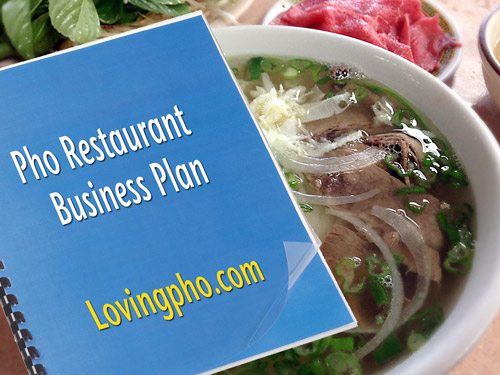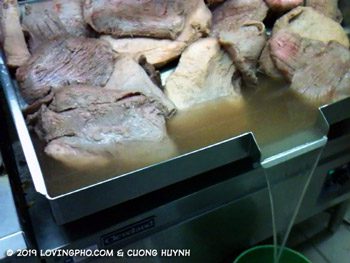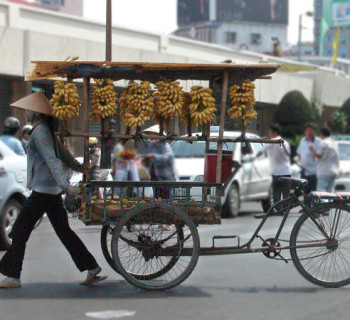This is Part 4 of a series on pho restaurant business plan. Read Part 1, Part 2 and Part 3.
Need a pho restaurant business plan done but don’t know how to do it yourself? Click to learn about my Pho Restaurant Business Plan service.
Updated 12-31-19. You may have seen my articles on pho restaurant business plan (see links above). Here's the fourth in the series to help put a little more meat on the bone (no pun intended 😉 ).
 At its core, a great business plan must tell the reader about the business; the business' reason for being; its value proposition, mission and vision; how it will live, play and survive in the marketplace (external factors); how it will operate to achieve its goals and beat its competition (internal factors); how it will determine its success or failure; and whether it will make a profit and when.
At its core, a great business plan must tell the reader about the business; the business' reason for being; its value proposition, mission and vision; how it will live, play and survive in the marketplace (external factors); how it will operate to achieve its goals and beat its competition (internal factors); how it will determine its success or failure; and whether it will make a profit and when.
For those who want to do your own research and/or write your own pho restaurant business plans, then the information below serves as a template for you to start. If you'd like me to assist, then you can employ my service to create a pho restaurant business plan for you.
Pho Restaurant Business Plan Template
So without further ado, here are the key elements of a solid pho restaurant business plan.
- COMPANY DESCRIPTION
- Company name
- Restaurant name
- Business address (if known)
- Restaurant description
- Restaurant concept (quick serve, fast casual, full service)
- Capitalization
- Legal structure (owners and ownership format)
- BUSINESS CONCEPT
- Concept description
- Business vision and mission statement
- Value proposition
- Sample menu
- Restaurant design/layouts
- Goals and objectives (first 12 months, 2nd & 3rd year, beyond 3 years)
- Professional advisor(s)
- MANAGEMENT TEAM
- Owner/operator
- General partner(s) if any
- Minority partner(s) if any
- Management agreement
- Confidential agreements
- MARKET ANALYSIS
- Industry assessment
- Target market
- Location analysis
- Competitive analysis
- MARKETING STRATEGY
- Online presence (website, social media, review sites, etc.)
- Customer database
- Frequent diner/loyalty program
- Email campaign
- Mailer campaign
- Community/charity involvement
- Business relationships
- 4 walls marketing
- Public relations
- Advertising
- OPERATIONS
- Staffing
- Training
- Daily operations and production
- Customer service
- Suppliers
- Management controls (POS, time & attendance, scheduling, checklists, inventory, cash audits, performance/safety/liability reviews)
- Administrative systems (daily cash control, weekly prime cost report, purchasing records/payables, accounting system, payroll processing)
- INVESTMENT ANALYSIS
- Source of funding
- Capital contributions (investment roles)
- Return of investment (ROI) analysis
- Equity analysis
- GROWTH PLAN/EXIT STRATEGY
- Expansion plan
- Investor exit options
- Investor expansion options
- FINANCIAL PROJECTIONS
- Project sources and uses of cash
- Capital budget (start-up cost projections)
- Sales projection
- Hourly labor projection
- Detailed statement of income and cash flow - Year 1
- Summary statements of income and cash flow - Years 1-5
- Return of investment projection
- Break-even cash flow projection
- PRO FORMA
- Spreadsheets/worksheets to support section 9 above.
So there you have it. If it looks overwhelming, then you're right. It is overwhelming and is a lot of work.
But opening and operating a restaurant is a lot of work, so you might as well know this now, right?
When properly used, the business plan template above will lead you step by step to fill in all important aspects of your pho restaurant business. It will help you organize your thoughts and plans, and will keep you on the right path.
Those opened and failed most definitely didn't have a business plan to work with. Many who opened and succeeded without a business plan are mostly lucky. Nothing wrong with being lucky. In fact all successes have some luck associated with them. But what matters most is what you will do now that you're lucky enough to survive initial failure, what you will do to ensure continued luck to come your way.
For aspiring pho restaurant operators, it should be clear which route one should to take: have a business plan and follow it, and make your own luck.
Please leave your feedback in the comments below and let me know what you think.
For professional assistance with a business plan and pro forma, head over to the page Pho Restaurant Business Plan and book a FREE half-hour consultation to get started.




Can someone clarify if there are differences between a business plan for investors versus one for a landlord? And if so what are some differences? I’m need to do both of these things and wonder if I need to have 2 versions to present my business in the best light possible. Thank you.
@DavidGM2: If you do a good and complete job creating a business plan, then I think you only need one good version.
While different parties (banker/loan, landlord, investor) look for different things in a business plan, almost all those things are interrelated. A banker may look for things that give them confidence they’ll get their loan paid back and your ability to service the loan. On the other hand, an investor has his/her own self-interest to look out for, including breakeven point and payback time. For a landlord, they want to know your ability to run your restaurant profitably so that you’ll pay the lease on time.
Of course each party also look at many other aspects of your business to arrive at their decision to do business with you. However, the above areas are typical differences between each party’s priority.
With all that said, if you put your effort into developing a solid business plan for your new business, then it also serves as an excellent roadmap for you to build it.
Do you have any experience with the Pho industry and what pho restaurant did you draw that experience from? What is the name of your restaurant?
@Boss: Thanks for the question. If you haven’t read my work and how I help others, both on this website and in the Pho Forums, then I encourage you to do so to learn more in depth about what I offer. There are a lot of content that I share and help people in steering them in the right direction; in figuring out what they should/need to do; in avoiding needless and costly mistakes; and in getting to grand opening in the most efficient way. The content alone should be evident of my experience and ability.
As a B2B service, all pho restaurant projects and clients are confidential information. Almost all my clients require this, and I do not disclose this information especially to just anyone asking over the Internet. If you need assistance to open your own pho restaurant, then you can book a free 1/2 hour phone consultation to discuss how I can help get you to where you want to be.